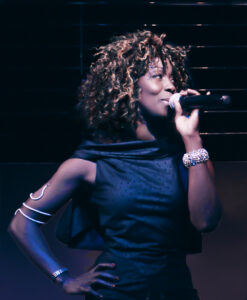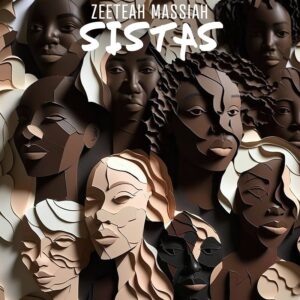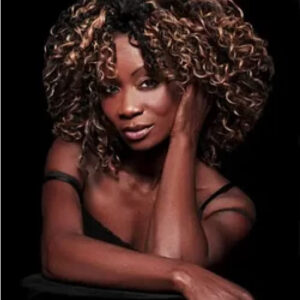
British vocalist Zeeteah Massiah has had a notable musical journey. She has performed in an award-winning London show, toured with music’s biggest icons, and was a Eurovision finalist. “Slide on the Rhythm” the 1993 #1 Billboard dance hit, featured her as lead vocalist. The Barbados born singer moved to London at the age of five with her parents. Her music career would take her to Germany in 2001 and back to England in 2012.
Zeeteah had started her professional singing career when someone told her about auditions for Little Shop of Horrors in London’s West End. She hadn’t done any acting previously, but landed the role of Chiffon. She played the role for the last nine months of the award-winning show’s run in 1984.
In 1988, Zeeteah sung with Kim Wilde on the European leg of Michael Jackson’s BAD tour. She toured the world with Tom Jones in 1994/95. In 2001 she went on tour for three months with Eikichi Yazawa, one of Japan’s biggest rock icons. Zeeteah also toured with French megastar Johnny Hallyday. She says there were many incredible moments during this time. They include playing giant stadiums with Yazawa, and singing a duet with Hallyday at the Bercy Arena in Paris.
In 2010, Zeeteah’s began a musical and romantic journey with her husband, Paul Caplin. She moved back to London in 2012 to be with him and the couple married in 2016. Zeeteah released two albums, Juice in 2014 and Maybe Tomorrow in 2016, both produced by Caplin. Together they write songs with Caplin handling the production and arrangements on the tracks. They create music that mixes up reggae, dancehall, soul, and jazz. However, they decided that going forward they would use reggae and dancehall beats as the foundation of their music. The result was the 2022 album, Wat a Ting.
Zeeteah and Caplin are currently working on a new album that continues with the Dancehall theme but with more Afrobeats influence.
Her new single “Sistas” dropped on May 12, 2023.
I recently interviewed Zeeteah about her new music and album, songwriting process, the biggest challenge of her career, tour experiences with Tom Jones and Japanese rock icon Yazawa, musical journey with husband Paul Caplin, the scary moment during her Eurovision live performance, and much, much more.
Congratulations, Zeeteah, on the release of your new single, Start, from your 2022 album Wat a Ting. Your voice is beautifully captivating with the soothing soundscape of reggae and jazz. Tell us more about the song. What would you like for listeners to come away with after hearing it?
A few years ago I saw the movie Southside With You. I enjoyed the story of Barack and Michelle Obama’s courtship, but what I remember most about the film was the music over the closing credits. It was Start, a song written by John Legend especially for the film, and I fell in love with it the moment I heard it. I remember driving my husband Paul crazy by playing it over and over again for hours.
The song is about new love, and having the courage to seize the opportunity that it presents and to overcome our fear of the unknown. I used to sing it live as a piano ballad, but when Paul and I were working on the album, he suggested giving it a completely different reggae treatment.
One of our goals for the album, Wat A Ting, was to try and layer jazz flavours over roots reggae grooves and, I think that we’ve achieved that best in this particular song. I’m so happy with the way it turned out.
Your previous album Maybe Tomorrow was a collection of jazz classics. Explain what inspired you to have your new album, Wat a Ting return to your reggae and dance hall roots.
I’ve always loved jazz, and I’ve always loved singing jazz. Between 2012 and 2019 I was lucky enough to be able to work with a group of incredibly talented jazz musicians, and I loved what we did together during that time.
We released two albums in that style. But Paul and I both love to dance and we both love the power of the groove. So we decided to lay a new foundation for our music going forward using reggae and dancehall beats. We found some great reggae players to work with, and the album Wat A Ting is the result.
With your husband Paul Caplin and your band, you like to create music that mixes up reggae, dance hall, soul, and jazz. How long have you been writing music together? What is your songwriting process?
Our musical journey and our romantic journey both began in 2010, and the two are really inextricably connected. I moved back to London from Cologne in 2012 to be with Paul, and we’ve been together ever since. We were married in 2016 on the island of Isle à Quatre in the Grenadines.
Paul does all the arrangements and production on our tracks. We write songs together. Paul says that I provide all the inspiration, but he does most of the heavy lifting when we’re crafting the songs.
We mix up different styles simply because that’s how the best music comes about.
We’re lucky enough to have a recording studio at home, and you can find us there at any time of the day or night putting down ideas.
Tell us about your experience playing the role of Chiffon in the award-winning musical Little of Shop of Horrors in London in 1984.
It seems like a lifetime ago now. I was just starting my career as a professional singer, and someone told me about the auditions for the show. I went along not really expecting to get the part, and I was overjoyed and a little bit nervous when they offered it to me – I’d never done any acting before.
But I knew how to sing and I knew how to dance, and I got the hang of it pretty quickly. I was in the show for the last nine months of its run and it was an amazing experience singing on the West End stage. I wouldn’t have missed it for anything.
You have sung with Kim Wilde on the European leg of Michael Jackson’s BAD tour and toured the world with Tom Jones, as well as with many other iconic artists including Eikichi Yazawa and Johnny Hallyday. How did these opportunities come about? What were those experiences like? Any favorite moments you’d like to share?
It’s funny – people often ask me how I found the amazing opportunities that have come my way, and the answer is, I didn’t. They found me. I suppose I must be blessed with a special voice, because all of my life people have been asking me to sing with them.
Of course, life on tour is hard work, and singing night after night in front of hundreds of thousands of people requires professionalism and constant focus. But I’ve always taken my work as a singer very seriously, and maybe that’s another reason why people want to work with me.
What were those experiences like? Wow. Hard to know where to start. There were so many incredible moments. I used to tour Japan regularly with Yazawa, one of the biggest Japanese rock icons. We always played giant stadiums, stayed in the best hotels, and were treated like royalty. But in terms of having fun, the world tour with Tom Jones has to be near the top of the list. Tom is amazing to work with, and the tour was like one long party.
If I had to pick a single magical moment from those days, though, it would probably be singing a duet with French megastar Johnny Hallyday at the giant Bercy Arena in Paris. Johnny was truly one of a kind, and is greatly missed by all who knew and loved him. Over a million people lined the streets for his state funeral in Paris five years ago.
In 2008 while living in Germany you spent nine months as a featured singer in the hit show Fantissima which is described as “creating fascinating worlds with the kind of elaborate technology normally found on large concert stages and a holistic artistic approach.” Tell us more about what that means and your experience performing in it.
Fantissima was an extraordinary extravaganza, billed as “Germany’s most successful show”. I was the compère as well as singing and dancing throughout the show. It was great to be involved in something on that scale, although it was very hard work and sometimes exhausting. But the rest of the cast included some wonderful and incredibly talented artists, and it was a thrill to work with them.
Sadly, a few months into the show’s run, my Father died. It was a terrible blow, but I still had to go on stage that evening and carry on. That was tough.
What did it feel like to be a UK finalist in the 1996 Eurovision Song Contest with the song, “A Little Love”?
Honestly, I only entered the contest as a bit of fun and I never expected to get as far as I did. But it was a really good song, and people still come up to me at my gigs to this day and tell me how much they liked it.
The final itself was almost a disaster, though. I was on the TV set, full of nerves, about to sing live to millions of people. The music started, I started to sing the first line and… there was no sound. Someone had forgotten to switch on my stage monitor. As anyone who has ever sung on stage knows, you can’t sing if you can’t hear yourself. It’s like trying to cross a motorway with your eyes closed. But I struggled on and kept smiling. After a while the sound appeared, and I somehow got through the rest of the song. That may well have been the scariest experience I’ve ever had on stage.
What has been your biggest challenge in your music career? How did you overcome it?
In the 1990s I was booked as an additional vocalist on a year-long tour by one of the biggest UK pop stars. I won’t mention his name. It was an amazing gig to get, and I cancelled everything else in my calendar for the whole year.
In the run-up to the tour, we did a series of promotional TV appearances. On one of them, the boxer Frank Bruno was being interviewed via satellite. His little daughter was in the studio, and took a great interest in me, while ignoring the pop star. This particular star was notorious for his vanity, and I could see him getting more and more miffed at not being the centre of attention. There wasn’t much I could do about it, but I could feel his resentment.
The very next day I got a call from his office to tell me I was no longer on the tour. In that instant, I lost a year’s work. And I had already cancelled all my previous bookings.
The music business is, unfortunately, full of big and fragile egos and some not very nice people. If the same thing happened to me today, I wouldn’t hesitate to sue for breach of contract. But back then I was too naive and unsure of myself to take on such a big star.
What does it mean to you personally to be an indie music woman artist?
Indie. Music. Woman. Artist.
Let me take those words one at a time.
Music has always been my life and I can’t imagine it any other way. And there’s not much point being a musician if you’re not an Artist.
Woman? Being a Black woman in Western society is not always an easy thing but I’m very proud of what both Black people and women have achieved over the last century. Now we just have to keep going.
Indie? We’re lucky to live in an age where we can make music at home, distribute it and promote it without having to give half of our rights away to a record company. Paul and I are loving the challenge of doing it all ourselves this time around (we’ve both had hits with major labels in the past) and I think we’re doing okay.
How do you think women artists can be better supported in the indie music industry?
I’m honestly not aware of a difference between how female artists and male artists are supported, so I’ll just talk about artists in general.
We live in an age when making and distributing music has become so easy that supply far outstrips demand. Over a hundred thousand new tracks are released on Spotify every single day, and only a fraction of those ever get more than a few streams.
It’s hard work writing, recording and releasing a song, but once it’s out there, that’s when the real work starts. Unless you have the resources and skills to get your music heard among all the noise, you don’t stand a chance – no matter how good the music is.
The best support that anyone could give to an inspiring artist is to help them navigate the minefield of contradictory and bogus advice about music promotion that’s floating around YouTube and Social Media, and to steer them away from the many hucksters selling ineffective promotional services.
And –- tough as it may be – to tell them that this is not an industry in which they have any chance of making a living unless their music is truly exceptional.
What is your favorite microphone to use when recording and/or performing and why?
Recording: A Neumann U87 through a Manley Voxbox.
Live: My trusty wireless Shure SM58.
What projects do you have planned for the rest of this year?
We’re deep into writing our new album, which continues the Dancehall theme but with a lot more influence from Afrobeats, which we love. The first single will be out in a few weeks. Follow me on Spotify to make sure you don’t miss it, or sign up on zeeteah.com.
Follow Zeeteah on her Spotify Artist Page Instagram and Facebook


